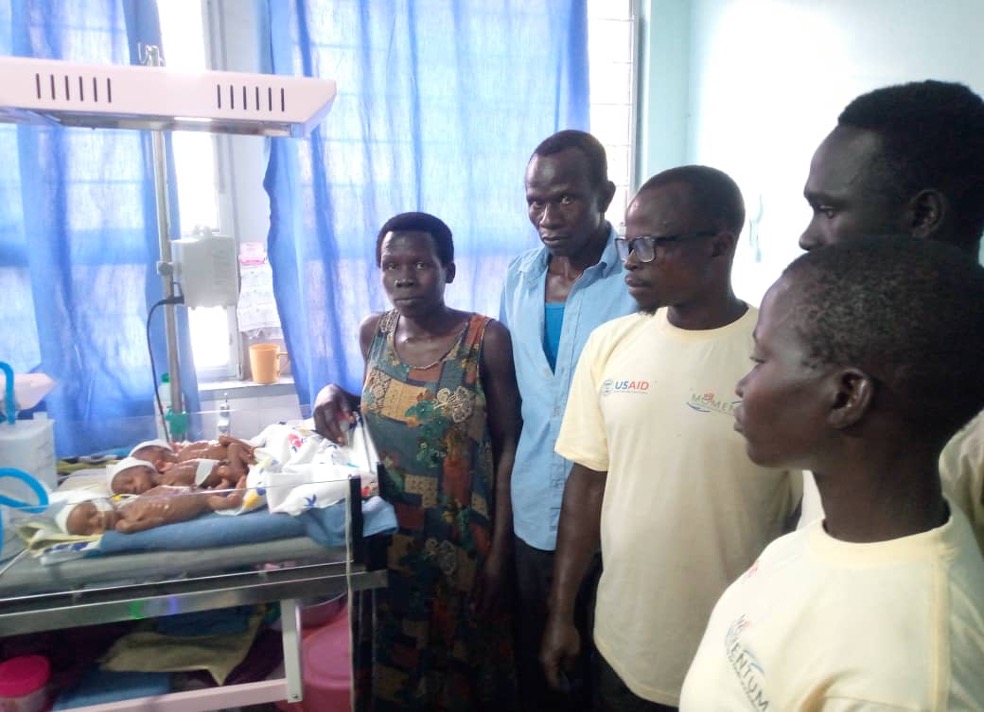Triplets Safely Born to Mother Who Received Extensive Care During Pregnancy
Published on May 10, 2023
By June Ojukwu, South Sudan Community Service Delivery Advisor, MOMENTUM Integrated Health Resilience, and Yvette Ribaira, Community Health Lead, MOMENTUM Integrated Health Resilience
Check out our new blog to learn how the triplets are doing one year later.
Thirty-one-year-old Jessica Kiden and her husband David Taban, 39, live in Ndindiro village (or “boma”) in Kajo-Keji County, South Sudan. They were expecting their third child when they met Annet Namadi, a boma health worker working with family members in Ndindiro as part of USAID’s MOMENTUM Integrated Health Resilience project activities to monitor the health of families and communities.

MOMENTUM assists USAID partner countries such as South Sudan in selecting, adapting, and scaling up high-impact maternal and newborn health interventions while also working to strengthen the quality and reach of community health care for women who cannot routinely access health facilities. These activities align with USAID’s goal of creating a world where “all women, newborns, and children survive and are healthy and able to reach their full potential.”
Through MOMENTUM, Annet received training in “Safe Motherhood,” a course that better enables her to help the families in Ndindiro, where she also lives. “Safe Motherhood” covers a range of topics from birth planning to postnatal care—providing guidance in key areas, including educating mothers and their families to identify pregnancy danger signs, encouraging mothers to deliver at health facilities, helping families prepare for deliveries, checking newborns for danger signs, and using effective breastfeeding techniques.
After evaluating Jessica, Annet enrolled her in antenatal care (ANC) at the Litoba Primary Health Care Unit (PHCU), several miles from their village. Annet then tracked Jessica’s case every time she came to the facility for an exam and regularly checked her ANC card—which was used to keep a record of Jessica’s visits, her medical and obstetric history, and information relating to her pregnancy.
On her fourth visit, Jessica had swelling in her feet, face, and hands, as well as a fever—all danger signs during a pregnancy. Annet immediately referred Jessica to a MOMENTUM-supported health facility for care.
“I am happy to have Annet Namadi,” said Jessica. “She kept following me right from the time she referred me until I was enrolled for ANC attendance. She kept visiting me and asking if my pregnancy was developing normally. I wouldn’t have known of what are called ‘pregnancy danger signs’ if she had not visited me.”
According to UNICEF, “Complications during pregnancy and childbirth are a leading cause of death among women in South Sudan, which has the fifth-highest maternal mortality rate in the world. … But most maternal deaths can be prevented if birth deliveries are done by skilled health professionals with the right equipment and supplies.”1
In early February, Jessica again had swelling in her feet, so Annet sent her back to Litoba PHCU for observation. However, her husband David requested that Jessica instead be taken to Moyo Hospital, just across the border in northern Uganda, where local conditions are more secure than the fragile, conflict-affected areas in South Sudan. Throughout Jessica’s stay, Annet regularly followed up and ensured that she received proper care—from being admitted to the hospital in a timely manner to receiving the attention she needed as an expectant mother.
“Every time I feel unwell, [Annet] comes to me,” said Jessica. “I have never found this sense of solidarity anywhere else.”
On February 16, in just her seventh month of pregnancy, Jessica gave birth to premature triplets, who were then admitted to the intensive care unit. “I didn’t expect my wife to deliver triplets,” said David. “I now understand the relevance of ANC attendance through Annet’s teaching … and [I] will use this experience to teach other men about ANC visits.”
After the birth, Annet continued to provide follow-up care to ensure that Jessica received mental health and psychosocial support along with the triplets’ essential newborn care at referral sites. “I want to sincerely thank Annet for … teaching us to know about the advantages of ANC visits,” said Jessica. “Though I’m still weak, and my babies still can’t breastfeed, I am confident [they] will be well soon.”
Upon the field team’s last check, the triplets were doing well and exclusively breastfeeding, a good sign as they progress in their third month in the world.
Reference:
- UNICEF, Making childbirth safer in South Sudan, https://www.unicef.org/stories/making-childbirth-safer-south-sudan.

